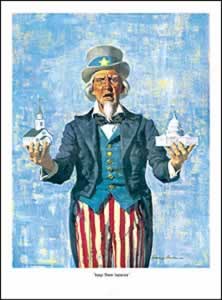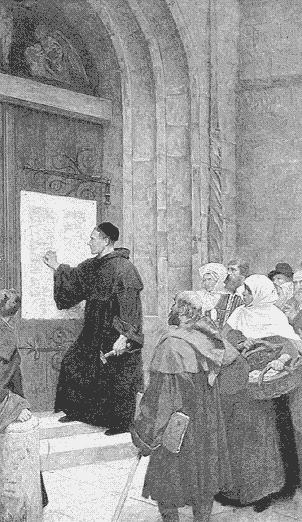by Merle d'Aubigné
About the year 1498, Martin Luther, was nearly fifteen years old. So great was the poverty of his parents that upon going from home to school in another town he, along with other children, was for a time obliged obtain his food by singing from door to door, and he often suffered from hunger.
One day these children, at the beginning of their hungry labor, stopped before a house and sang, as was their habit. Being turned away, they moved on, singing as they went. "Be off with you!" was their coarse greeting; and tears fell from Martin's eyes. Yet he was not discouraged; he stopped before a third house, and selected his sweetest hymn. His fine alto voice combined with the voice of his friends, and a strain full of harmony arose, begging bread of the wealthy inhabitants of the house. The song ended, yet nobody appeared. Upon this, Martin timidly went up and knocked at the door. "Idler! beggar! vagabond!" - this was all the alms they gave him. They refused a crust of bread to him who was destined ere long to become benefactor of Germany and of the world.
The poor boy shrunk back affrighted: his heart was wrung with grief; and he withdrew, a prey to shame and sorrow. "What!" said he mournfully to himself; "are we to be despised because we sing for bread? Have not many great doctors and gentlemen begun like us?" And then he added bitterly: "Must I give up my studies, return to my father's, and work in the mines at Mansfeld?"
The unfortunate Martin was indulging in these gloomy reflections in St. George's Square, in front of a house of good appearance, inhabited by Ursula Cotta, a pious and wealthy woman, daughter of a rich burgomaster of Iiefeld. When she heard the distant voices of the students, she has approached the window, and witnessed the repeated humiliations inflicted on the poor boy. The scholar's beautiful voice and fervent prayers had long since attracted her attention at church, and she had seen with interest young Martin come near her house. The latter, dishearted, was preparing to return home with empty pockets and heart bowed down with sorrow, when suddenly--oh, what joy!...he can scarcely believe his eyes...a door opens, a lady dressed in an elegant constume, according to the fashion of the times, appears on the threshold, descends the steps, and approaching him, says, "Come here, my boy; come into my house: I will give you some bread." She set him down at her table, spoke to him in sympathizing tones, and a few days after, being received under her roof, the poor scholar saw his studies secured. From that hour Martin Luther prayed with more faith and studied with more ardour.
"Take heed that ye despise not one of these little ones; for I say unto you, That in heaven their angels do always behold the face of my Father which is in heaven." Mattew 18:10.
The charity of this Christian woman had worked in him a great transformation. The school and his books had become dearer to him. He felt in his heart an inexpressible rapture. Sorrow had given place to joy, and in his leisure hours he practiced on the flue and the lute. The chronicle of Eisenach calls Ursula "the pious Shunamite," in remembrance of that rich woman of Shunem who constrained the prophet Elisha to enter her house (2 Kings 4); and Martin himself, thinking of his adoptive mother, gave utterance in after-years to the beautiful thought: "There is nothing on earth sweeter than the heart of a pious woman."
* * * * *
"And whosoever shall give to drink unto one of these little ones a cup of cold water only in the name of a disciple, verily I say unto you, he shall in no wise lose his reward." Matthew 10:42. "Take heed that ye despise not one of these little ones; for I say unto you, That in heaven their angels do always behold the face of my Father which is in heaven." Mattew 18:10.

















0 comments:
Post a Comment